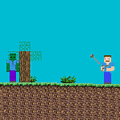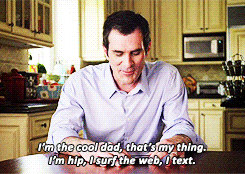And now, a conversation with a dad
Keith Gessen on being mad dad, fun dad, cheap dad, thoughtful dad--i.e., Dad.
Keith Gessen is a journalist/author who recently published Raising Raffi: The First Five Years, a collection of essays examining early fatherhood. I found it relatable in that I’m married to a man who considered himself to be a very rational, amiable, even-tempered creative fellow who then ended up living with the chaos agents known as children (and in both of our families’ cases, two boys.) It’s a glimpse of an era of parenthood where you think you have more choices than you do, and also one of the first retrospective snapshots I’ve read that describes parenting during the early months of COVID, which is a little painful to revisit but also reassuring to realize we were going through the same anxiety, the same exhaustion, the same fights with our spouses—he is married to author/journalist/editor Emily Gould, whose wonderful newsletter is witchy and honest and covers culture/food with the same scrutiny as she applies to her own life. Keith and I had a wide-ranging conversation a few weeks ago about his book, about being a parent who yells, about guilt and whether there is any practical knowledge in parenting books. This is a very condensed version of our conversation:
Your book, to me, is a sketch of a part of parenthood where you have these philosophical questions about “What kind of parent do I want to be?” You read books about different ways parenting and think they sound good, but your kid may end up requiring a whole other approach. What perspective have you gleaned about what type of parent you are now that you’re through the first five years?
Somebody asked me the other day whether I read all those advice books because I was writing a book. And I was like, “No. I needed advice.” I read them very much in earnest.
I found they’re all very appealing when you read them. There’s one that I describe, where you ignore [attention-seeking behavior], and you’re like, “Oh, that’s appealing. I want to be this stoic.” It’s very evidence-based. They’re like, “We studied animals and timeouts don’t work on animals.” And you’re like, “Okay, that’s very reductive. My kid is not an animal. I mean, he is. But I also want to be this scientist parent.” It turns out, you can’t. Or, I couldn’t do it.
Then, the opposite of that is empathetic parenting. “I see you want ice cream. Oh, it’s very frustrating not to get ice cream.” Emily’s pretty good at that. I am not.
So on the one hand there’s the dialectic between what you yourself are capable of as a parent. And then there’s also what your kid responds to. Raffi did not respond very well to that empathy. By the time I started trying, it was a little too late for him. He was too smart. I would do something these positive discipline podcasts advised and he would just see right through it.
It was helpful to me in a way to be like, these parenting practices are embedded. That’s what I learned from that a book by Jonathan Tudge who’s this developmental psychologist /cultural anthropologist. You can’t just choose, when you’re living in New York, to become a French parent. Well, if you’re French and you surround yourself with French people, you could get some of the way there. But even so, you wouldn’t have all these supports that the French state gives.
The cultural practices are deeply embedded in your economic situation, in your historical situation, in your cultural situation. You also have your own background. I was raised in this Soviet, Jewish, very loving, but very academically focused family, with the experience of being an immigrant—our way forward in America was through school. And my dad was a bit of a yeller. As much as I want to be like, “Oh, it doesn’t matter,” it’s pretty deep inside of me. Understanding that that’s what I’m bringing to my parenting was helpful. I’m like, “I yell and I care about doing our homework and that’s okay.”
So now that you’ve gone through this early parenting stage, what type of wisdom do you find yourself passing along to new dads?
Well, it’s mostly “Live close to your daycare or school.” That’s my best advice.
I mean, the thing about dads is, we actually don’t talk about this stuff very much. When I was reading your questions and your newsletter, I was like, “Oh, I’m not sure Claire realizes how ignorant I am. And in fact, most men are.” It’s not a joke. In the book, I’m like, “Oh, Dumb Dad is this stereotype and it’s not helpful.” I do think we can get beyond Dumb Dad. But I was starting from a place of profound ignorance about all this stuff. And I think a lot of men are like that.
What, lately, do the kids do that bother you more than they bother Emily, and vice versa?
I’m more of rule follower in terms of being on time to school. Not that I’m a very on time person, but I’m very anxious about trying to be on time. So when the kids are not getting dressed in the morning, that tends to aggravate me. And Emily’s more like, “Ah, we’re late to school. It’s not the end of world.”
Emily doesn’t love when the kids jump on her. I don’t always love it, but I have more tolerance for being attacked.
I appreciated your honesty about losing your temper and yelling, which we all do. I think my husband used to believe his yelling must be very meaningful because he works so hard to be fun, patient and present for our boys that him that yelling must be very scary and impactful—and it’s not, at least anymore. Have you heard much from other dads who talk about yelling and getting mad at their kids?
That is something dads talk about actually—various descriptions of where they’ve gone that they have very vivid memories of. You’re not allowed to hit your kids. But we ideally wouldn’t be manhandling them either. But we do. I definitely do that much more than Emily. So dads talk about, like, “Oh, here’s the thing that I do that is right at the edge.” One dad’s telling me that he grabs his daughter by the chin, like, “You’ve got to listen to me.” I’ll pick them up by their armpits. And sometimes I am aware that it is uncomfortable for them to be picked up in that manner, if I get a grip that’s a little bit too much of the arm. One dad had a funny story about being on a flight and his toddler was just being too much of a pill, so his dad just gave him a bear hug, but it was too tight, and the kid was like, “You’re hurting me.” And dad was like, “Okay,” and stopped. That’s not best practices. I know. I don’t really know how I feel about all that stuff. It’s not great.
Do you ever pull back and marvel that you are a different dad than you expected, especially as you raise these future men?
I have. The amount of time I spent thinking about this before Raffi was born was pretty small. But when I did think about it, I was like, “Oh, I’m going to be cool dad. And I’ll be funny.” I wasn’t like, “Okay. What’s my reaction going to be when when they’re just trying to kill each other?” My interactions with them is trying to get them at the door in the morning, trying to get them to not kill each other before dinner, trying to do bedtime. You’ve just got to keep them apart so they don’t start wrestling and getting all worked up. There’s a lot of yelling about “Keep your hands to yourselves, lie down, listen to this book.” And then we can relax. Finally.
Eventually, they fall asleep. And then, as you said in your schedule, after they fall asleep, they’re such angels.
I hadn’t anticipated how much of my being a dad was going to be this stuff, that even if I was the coolest dad in the world, I would find myself a little bit on edge.
I was curious whether you have a different relationship with dad guilt versus what you perceive to be mom guilt.
I mean, this is partly what you write about in your newsletter, but obviously the culture is very set up to make moms feel guilty about everything. I think Emily felt more guilty than I did when we put Raffi into daycare. It’s interesting because when we talk about it, I’m like, “Ugh, leaving Raffi in aftercare—he’s just sitting there. Really, we should pick him up earlier.” And then when it’s actually my pickup, I pick him up pretty late. Emily, when we talk about it, is like, “He’s fine. He’s learning how to deal with boredom.” And then when it’s her turn to pick him up, she picks him up early. So we have a rhetoric versus action distinction between us. And yeah, possibly my rhetoric of “We need to pick him up earlier” is not helping anyway. I do feel guilty, obviously about yelling and stuff. But again, less guilty than I used to feel. Just as just I’m like, “This is it, this is me. I’m the one who yells.”
You talk about how in New York, where you live, class difference is so in your face—if you want to, you can hire people to do the majority of your child rearing and home keeping for you. I think about the struggles and pride my husband took in teaching our kids to ride their bikes and wonder why I felt a certain way when I learned you can pay someone to teach your kids to ride their bikes—am I judging or am I jealous of other people’s outsourcing abilities? I wonder if you have certain philosophies about what a dad ought to do for his kid vs. pay someone else to do.
Any philosophy I might have is overridden by this other philosophy that I have, which is that one should not spend money on anything. So whenever anybody’s like, “Oh, you could hire somebody to teach them to do that.” I’m like, “Why would I do that when I can do it?” The only thing that overcomes that is when it doubles as daycare or childcare. So then I’m like, “Oh, I can drop them off at this at Russian school for three hours? Sure, I could teach them Russian myself, but for three hours I can go do my own thing.”
My dad kept buying Raffi these bikes with training wheels, which is not best practice anymore. Everybody else had a balance bike, which is just clearly the better way to learn how to ride a bike. But I wasn’t going to go and buy a balance bike after my dad had given us these bikes with training wheels.
So Raffi had these training wheels, and it seemed like he would never learn. And then, when he was just a little older than five, we’d go out to this playground near us that has a soft rubbery surface. He fell down a few times, but he was totally courageous. He couldn’t stop, so he kept trashing to the fence, but he didn’t care. By the end of that, he was basically riding a bike. And I don’t know, I wouldn’t want to have not done that. I’m glad I did that.
But then there are some other things, like skating. Even dads who skate, they eventually outsource that because it’s so hard and it’s so frustrating and you are better off with a professional.
Is there anything about the book that you wish people have been asking you more about, that you’re like, “I feel like this should be in the conversation more”?
I am conscious of the fact that I know less about this stuff than a lot of people. There was a review in Slate that was like, “Women have written better versions of this book.” But in other ways, dads can be honest in a way that’s harder for women because of the sort of judgment that they would be subject to. A part of what enabled me to write this book is because I’m a guy who hangs out with other guys, and we don’t actually talk about this stuff that much. I wasn’t in my day-to-day life able to have these conversations in a manner that was satisfying to me. And I really wanted to.
Do you still read parenting books or are you taking a break?
Oh. I read the books when I have a problem. But actually, I’m working on a piece about kids who have been written about by their parents.
Did you discover irrefutable evidence that shows that all children who are written about their parents are one way?
Yes, yes, yes. They’re all ...
Happy.
They’re all happy and wonderful. I just read a memoir of Christopher Robin Milne, who is the son of the author of Winnie the Pooh and was featured in the Pooh books. And it did affect his life, and he had very mixed feelings about it. He ended up fighting for the British army in the war. When he came back from Italy where he’d been wounded, it was a big deal. People were like, “Christopher Robin was wounded in battle; what will he do next?” But then he had trouble finding a job—the British economy was really bad after the war. He ended up opening a bookstore. His mother was like, “Well, why are you doing that? You hated being Christopher Robin. You’re going to have a store where Winnie the Pooh books are. And people are going to be like, ‘Oh my God, you’re Christopher Robin.’ Why would you do that to yourself?” But he’s like, “I really enjoyed it. And yes, there were these books that I had mixed feelings about. But the other books, I really liked.”
Tell me something funny that the kids did recently.
Raffi yesterday said, “Dad, I want to have a better relationship with you.” I was like, “What does that mean? What show are you watching? I thought you were just playing Minecraft.” So that was curious.
End credits
Thanks for reading Evil Witches, a newsletter for people who happen to be mothers. Feel free to forward this issue to a dad or even a non-dad you know who might enjoy it. If you haven’t yet, I hope you consider becoming a paid subscriber which gets you bonus content and subscriber-only threads but moreover supports independent, unsponsored reporting, essays and humor:
The archives live here. If you have any questions, feedback, or suggestions for the newsletter you can reply to this email or talk to other witches on Twitter.
Evil Witches will be back next week but will be off the week after. It’s my parents’ 50th anniversary and they offered to take our entire family to either Disney or a much more parent-friendly type place and I chose the latter 😈.
Multimedia bonus: I got to be on the “On Boys” podcast with Jennifer L.W. Fink and Janet Allison talking about the newsletter, raising future men, ADHD, emails from school, finding good mom friends and what it means to be a witch. You may enjoy!






LOVE Keith Gessen and his writing! And this interview came at the absolute perfect time cause I JUST finished this book. Thank you for being the best newsletter on earth!
This is such a good conversation even if it did open up All My Feelings about having an almost-9-year-old who still cannot ride a bike. (We also did not get the balance bike memo and now she’s too tall? Not the point! More of this introspection and reflection from dads pls!)